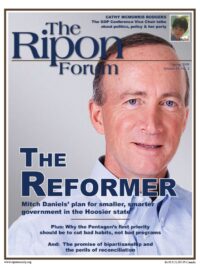
Cathy McMorris Rodgers represents Washington State’s 5th Congressional District in the U.S. House of Representatives. She currently serves as Vice Chair of the House Republican Conference, assisting in the development of the House Republicans’ communication strategy. She also serves on the House Armed Services Committee, the Education and Labor Committee, and the Natural Resources Committee. In addition, McMorris Rodgers founded the Congressional Hydropower Caucus. She recently sat down with FORUM Deputy Editor Meredith Freed to discuss the role of the GOP in the current Congress and her vision for the Party’s future.
RF: What is the role of the Republican Party in this Congress? How does the Party balance the role of “loyal opposition” with the responsibilities of shoring up the economy and protecting national security?
CMR: The role of the Republican Party is to be presenting our ideas, our solutions to the issues of the day — whether it is growing our economy, addressing health care, or meeting our energy needs. There are going to be times when we will find common ground with the Administration and with Democrats in Congress, and we need to look for those opportunities. But we also need to hold them accountable for promises they’ve made and, when all else fails, make sure that people understand an alternative approach is being introduced in Congress.
I don’t think any one party has all the best ideas, and we need to impress upon the Democrats that it is in America’s best interest that we work together.
RF: What do you see as the top priorities for this session? How can the Party garner support for Republican initiatives with Congress and the Presidency controlled by Democrats?
CMR: The top priority is the economy and taking steps to get our economy moving. Between the continued downturn in the economy and the layoffs we’re seeing, people are having a tough time finding a job or are uncertain about whether or not they’re going to have a job. Small businesses are struggling too — whether it’s just keeping their doors open or offering health care to their employees. And now, they’re facing such huge tax increases.
I don’t think any one party has all the best ideas, and we need to impress upon the Democrats that it is in America’s best interest that we work together. America is demanding that of us right now. Americans understand that when you’re in a crisis in your local communities, you come together not as Republicans or Democrats, but as a community. Americans expect that of us in Congress, too — to really show leadership, to put forward the best ideas, and do it in such a way that the result is a solution in the best interest of the country not a party.
RF: In the past, one of your priorities has been energy policy, particularly hydropower. Where does this issue fit into the GOP agenda for this session?
CMR: When you think about addressing the economy and getting our economy moving, energy policy is a huge piece of the solution. Energy is so important to our economic security. It’s also important to our national security. We can find some common ground with the Democrats on the goal of reducing our dependence on foreign oil, and we need to do that. The Republicans can find common ground in supporting renewables, and hydropower is a renewable source of energy.
“I don’t think any one party has all the best ideas, and we need to impress upon the Democrats that it is in America’s best interest that we work together.”
For the Pacific Northwest, we get the majority of our electricity from hydropower. In Washington State, it is almost two-thirds of our electricity, making Washington State one of the cleanest states in the country. We have some of the lowest levels of carbon emissions in the country. We do have a renewable portfolio standard, but we also have hydropower. The combination makes us about 80 percent renewable. It’s going to be important as we move forward that hydro is seen as a renewable source of electricity and Washington State is not penalized for already being clean. It’s estimated that we could double the amount of hydroelectricity in the country without building another dam, just with the infrastructure that currently exists. In addition, there’s new technology able to harness river currents and ocean waves to produce renewable hydropower. Hydropower has an important role in meeting increased renewables goals, as well as helping meet our overall energy needs.
RF: Prior to the November election, Speaker Pelosi said, “If the Democrats win and have substantial majorities, Congress of the United States will be more bipartisan.” What does the term “bipartisanship” mean in the context of this session and where are we likely to see it?
CMR: I’ve been encouraged how President Obama has been reaching out to the Republicans. From the very beginning, he said he wants to work with the Republicans. He met with the House Republican leadership several times prior to the passage of the stimulus bill. He also addressed the House Republican Conference for well over an hour and answered lots of questions. And we need to do more of that.
Unfortunately, we haven’t seen the Democrats in Congress as open to reaching out to the Republicans and working in a bipartisan fashion. I’m hopeful they will start recognizing it is an expectation of the American people that we work in a bipartisan fashion. It means going back to some of the campaign promises that both President Obama and Speaker Pelosi made — that we were going to follow regular order, that we were going to respect the role of the minority, that we were going to give them opportunities to introduce amendments, introduce alternatives. I think it’s important to good lawmaking and better outcomes to do so.
The challenge before Republicans is to update our message. Bring it into the 21st century. Talk to people in a way that they can understand how you can apply Republican principles, Republican values to the issues of the day.
In the ‘90s, President Clinton and the Republican Congress had to work together and there were successes because of it. In the ‘80’s, too, President Reagan worked with a Democrat Congress. Again, it was Republicans and Democrats working together to address the issues of the day. And we need to continue to work in that spirit.
RF: What do you hope to accomplish as Chair of the Republican Select Committee on Earmark Reform? What are the potential implications of earmark reform with regard to the economy?
CMR: The goal of this committee is for the Republicans to lead the effort on earmark reform. Our goals include significantly reducing the total number of earmarks, having earmarks based on merit, 100 percent disclosure of earmarks so that it would be easy for people both internally and externally to get information as to the earmarks that have been requested. Transparency is an important piece in providing accountability in the process, so that every step of the way people can get information. There should be an opportunity to bring up an earmark either in a committee or on the House floor and have members decide whether or not this is a wise use of taxpayer dollars.
These are some of the themes that we are trying to address in earmark reform. President Obama said that he wanted to reduce earmarks to the 1994 levels and require more transparency. That’s part of his change.gov agenda, and we would like to work with him to accomplish that goal.
RF: During the 1994 Congressional elections, the focused and well-defined message of the Republican “Contract with America” proved highly successful. Do you envision a similar national approach to the Republican message for 2010?
CMR: It is vital for Republicans to communicate our vision for America. In the past, we could have done a better job. People haven’t rejected Republican values or principles. Overall, people still believe in our basic values of fiscal responsibility, the rule of law, a limited role of government and personal responsibility. The challenge before Republicans is to update our message. Bring it into the 21st century. Talk to people in a way that they can understand how you can apply Republican principles, Republican values to the issues of the day.
“The challenge before Republicans is to update our message. Bring it into the 21st century. Talk to people in a way that they can understand how you can apply Republican principles, Republican values to the issues of the day.”
We must spend time as a party thinking about how we do that and how we communicate what our vision is for the country. No matter the issue — whether it’s economic opportunity, ensuring health care for all, energy independence — we need to make sure that the country understands how Republicans approach these goals. As Vice Chair of the Conference, I am focusing on new media and how to use new media to communicate with people all across the country directly.
It’s not just telling them what we’d like to do; it’s getting their input and engaging people all across the country, the best and the brightest, to help us champion the ideas we believe would be the best for the country.
RF: You are one of the few women in the Republican leadership on Capitol Hill. What does the Party need to do to encourage more women and minorities to become involved and join the GOP?
CMR: It’s really an exciting time for women in America. You see where women are starting more businesses; the fastest growing segment in the economy is women-owned businesses. It’s important to recognize women make 80 percent of the health care decisions in our country and 85 percent of the purchasing decisions in our country. Women are decision makers, and what the Republican Party needs to do is reach out to women and talk to them in terms of the issues women encounter every day.
Also, I’d like to focus on the importance of updating some of our laws. For example, I’ve introduced the Family-Friendly Workplace Act, which is to allow more flexibility in the workplace to take time off. If you put in your 40-hour week, rather than only having the option of being paid time-and-a-half, you could actually get time off of work for overtime. Some of these kinds of flexibility issues really resonate with women — especially those that are trying to balance workplace as well as family. And it’s not just women. Families in general need more flexibility so that they can decide how best to meet the demands of making a living and caring for a family.
People haven’t rejected Republican values or principles. Overall, people still believe in our basic values of fiscal responsibility, the rule of law, and limited role of government and personal responsibility.
One of the issues Republicans must address with women is health care, recognizing women make 80 percent of the health care decisions in this country. Women are experiencing the frustrations in our health care system and women will be key to thinking through how best to ensure people have access to quality and affordable health care, while still protecting the important relationship between doctor and their patient. A single payer, government-run system is not the only solution. Other solutions can ensure we have health care for all and women will play an important role in determining how we improve our health care system.





